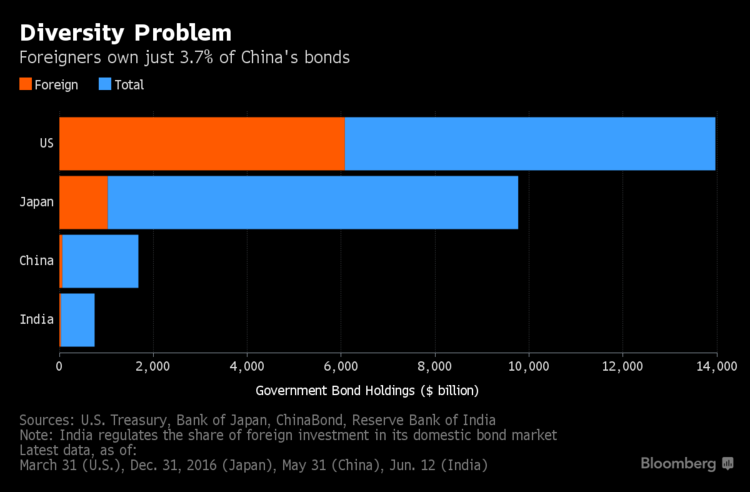Demand dynamics have also contributed to the shortage of haven assets.
Scarred by past purchases of developed-nation bonds that turned out to be less than safe in the global crisis, and investing in a world with a more subdued growth path since, investors have piled into assets seen as low risk, says Cui Li, head of macro research at CCB International Holdings Ltd. in Hong Kong.
“Can China help and should China open up? Sure,” Li says. “It helps to create financial stability in a world where U.S. Treasury bonds dominate,” by creating alternative vehicles for reserve assets, she said.
As Chinese markets join global indexes, their assets will increasingly gain global acceptance, argues Luke Spajic, head of portfolio management for emerging Asia at Pacific Investment Management Co. in Singapore.
It will just take time. In a sign of support for China’s efforts, the European Central Bank announced on Tuesday it shifted a small portion of its dollar reserves into yuan. But that’s one drop in an ocean of official holdings that’s on the rise again. State Street Global Advisors sees global reserves reclaiming their 2014 high by late 2020.
“These are some of the biggest debt markets in the world -- however, this market is in its infancy,” Spajic said of China’s corporate credit and government debt. “It may take years to reach developed-market standards, so investors must simply adapt to the terrain.”
In the meantime, Jen and Bandera worry about the unusual configuration of asset prices and their reaction -- or lack thereof -- to news and shocks. “The aggressive monetary policies have pushed the world into a cul-de-sac, the exit from which may not be orderly, we fear.”
“Absent of a massively large and liquid sovereign bond market which can act as free-risk collateral and benchmark for other instruments, no currency can ever become an international currency,” Garcia Herrero said. “China seems to have understood the lesson but, still, too much effort is put in developing the corporate bond market. This is like starting a house from the roof.”
This article was provided by Bloomberg News.
The Global Economy Is Rebounding, But There's One Big Problem
June 14, 2017
« Previous Article
| Next Article »
Login in order to post a comment








